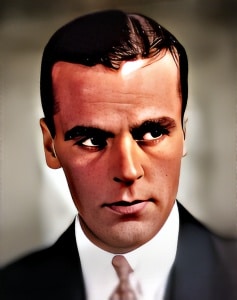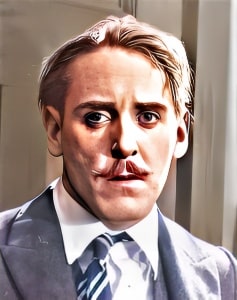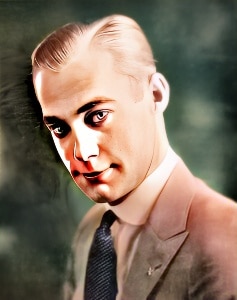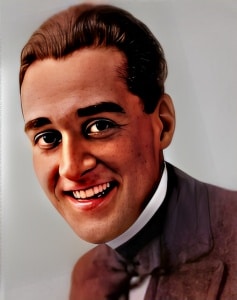 James Neil Hamilton, born on September 9, 1899, in Lynn, Massachusetts, was an American stage, film, and television actor whose career spanned over half a century.
James Neil Hamilton, born on September 9, 1899, in Lynn, Massachusetts, was an American stage, film, and television actor whose career spanned over half a century.
While he contributed to more than 260 productions in both the silent and sound eras, he is best remembered for his role as Commissioner Gordon on the iconic Batman TV series of the 1960s.
Hamilton’s entry into show business was unconventional, beginning as a shirt model in magazine advertisements. However, his interest in acting led him to join several stock companies, providing him with valuable experience and training in professional stage productions. This early foundation paved the way for Hamilton’s breakthrough in the film industry.
His cinematic journey commenced with a role in Vitagraph’s “The Beloved Impostor” (1918). However, it was his significant role in D. W. Griffith’s “ The White Rose” (1923) that marked a turning point in his career. Hamilton’s collaboration with Griffith extended to a film about post-World War I Germany, titled “Isn’t Life Wonderful” (1924), showcasing his commitment to exploring diverse and socially relevant narratives.
As his career gained momentum, Hamilton was signed by Paramount Pictures in the mid-1920s, becoming one of its leading men. Pairing frequently with actress Bebe Daniels, he demonstrated his versatility in roles such as one of Ronald Colman’s brothers in the original silent version of “Beau Geste” (1926) and Nick Carraway in the first film adaptation of “The Great Gatsby” (1926).
John Ford’s “Mother Machree” (1928) saw Hamilton starring alongside Victor McLaglen, and interestingly, the film’s title became a catchphrase for Gordon’s associate Chief O’Hara on the Batman television series, solidifying Hamilton’s lasting impact on popular culture.
In 1930, Hamilton played the squadron commander in the original production of “The Dawn Patrol,” a role later undertaken by Basil Rathbone in the 1938 remake. He continued to secure prominent roles, such as appearing above newcomer Clark Gable in “Laughing Sinners” (1931), further solidifying his position in the Hollywood landscape.
Hamilton’s involvement in the early Tarzan films, including originating the role of Harry Holt in “Tarzan the Ape Man” (1932), showcased his ability to navigate various genres. He reprised the role in the pre-Code sequel “Tarzan and His Mate” (1934) at Metro-Goldwyn-Mayer.
However, as “A”-level opportunities diminished in the 1940s, Hamilton adapted to working in serials, “B” films, and low-budget projects. Notable among these was his role as the villain in “King of the Texas Rangers” (1941), one of Republic Pictures’ successful movie serials.
In “Since You Went Away” (1944), a film centered on the home front during World War II, Hamilton’s character was represented solely through still photographs, emphasizing the impact of war on families. He also ventured into film noir with “When Strangers Marry” (1944), where he starred alongside Robert Mitchum.
Hamilton faced professional challenges in the late 1940s and early 1950s but found solace in his Roman Catholic faith during this trying period. The actor’s resilience and dedication to his craft eventually led to a resurgence when television emerged as a new platform for storytelling.
During the television era, Hamilton hosted “Hollywood Screen Test” (1948-1953), co-starred in the short-lived sitcom “That Wonderful Guy” with Jack Lemmon (1949–50), and made guest appearances on various series of the 1950s and 1960s, including seven episodes of “Perry Mason.”
His stage presence extended to Broadway with performances in productions like “Many Happy Returns” (1945), “The Men We Marry” (1948), “To Be Continued” (1952), and “Late Love” (1953–54), showcasing his versatility in both film and theater.
In 1960, Hamilton took on a role initially intended for Richard Cromwell in 20th Century Fox’s “The Little Shepherd of Kingdom Come.” Throughout the 1960s, he collaborated with Jerry Lewis in films like “The Patsy” (1964), “The Family Jewels” (1965), and “Which Way to the Front?” (1970).
Hamilton’s memorable role as Police Commissioner James Gordon in the Batman television series (1966–68) and the 1966 film of the same name became a cultural touchstone. Yvonne Craig, who played Commissioner Gordon’s daughter Barbara, praised Hamilton’s professionalism, describing him as a consummate professional who never missed a beat.
His extensive filmography includes notable works such as “Tarzan the Ape Man,” “Beau Geste,” “The Great Gatsby,” “The Dawn Patrol,” and “The Little Shepherd of Kingdom Come.” While his contributions to “A”-level Hollywood productions may have waned over time, Hamilton’s enduring career and adaptability showcase a commitment to the craft of acting.
In his later years, Hamilton continued to make valuable contributions to the entertainment industry, leaving an indelible legacy. His portrayal of Commissioner Gordon remains etched in the memories of Batman fans worldwide, a testament to his ability to bring depth and authenticity to his characters.
James Neil Hamilton passed away on September 24, 1984, leaving behind a body of work that spans the evolution of American cinema. From the silent era to the television age, Hamilton’s contributions to storytelling endure, and his influence on subsequent generations of actors is a testament to his enduring impact on the world of entertainment.
Loading live eBay listings...




